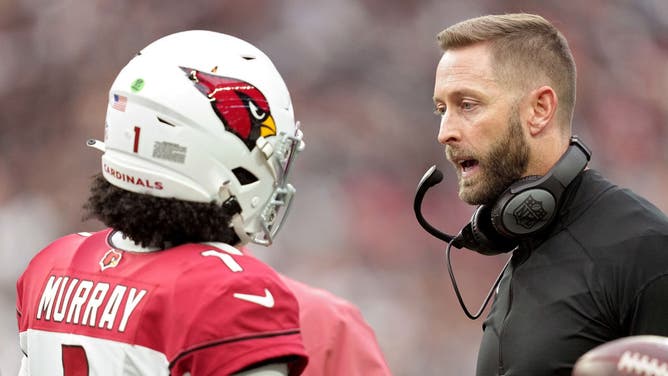Raising Arizona Almost Impossible With Declining Kyler Murray And Flawed Kliff Kingsbury
Is the next general manager of the Arizona Cardinals brave enough to burn the owner’s money?
Or will he even have a chance if he believes that’s the answer?
With the writing on the wall that Cardinals General Manager Steve Keim will be fired at the end of another disappointing season, the question swirling around the league is about how much freedom owner Michael Bidwill will give the next person to take the job.
Will that person be able to get rid of coach Kliff Kingsbury and quarterback Kyler Murray if he sees fit? Moreover, will that person get additional time depending on how long it takes to escape from Murray’s monstrous contract.
“It might be the worst job out there,” one executive said.
“It’s beyond being the worst, especially if you don’t believe in the quarterback because you're stuck with them,” another executive said. “You might be forced to keep Kingsbury for a year or two so that you have somebody who can work with Murray. When you think about it, you can’t even do a true rebuild until 2025.”

Both Kliff Kingsbury and Kyler Murray have been disappointments in Arizona this season. (Getty Images).
The Cardinals put themselves in a deeper hole than most people truly understand when they gave Kingsbury a six-year contract extension and Murray a five-year deal last offseason. Kingsbury, who is 5-18 since the middle of last season, can still be fired with Bidwill only losing the remaining money on the contract. Murray's situation, however, is far more complicated.
Kyler Murray Contract Is A Major Issue In Arizona
If the Cardinals trade or release Murray this offseason, they would have to take a salary cap hit of $97 million in 2023. That's unless another team was willing to pay off the remaining salary guarantees. In 2024, the dead money on Murray's deal is still $81 million. In either case, those numbers would be crippling to the franchise.
Then again, the Cardinals might be crippled either way because of the combined deterioration of the roster, Kingsbury’s system and Murray’s skill set. It's a remarkable meltdown since last season when the Cardinals were 10-2 at one point and seemed like the best team in football.
“They were the healthiest team in football then,” one of the executives said. “That’s how this league works. If your team is healthy, you can compete. The question is how does your team do after a few injuries. That team was a house of cards.”
That’s a bad pun.
“No pun intended. I’m serious.”
A year ago, the Cardinals had defensive linemen J.J. Watt and Chandler Jones playing effectively. Watt got hurt after seven games and Jones started to show his age. So much so that the Cardinals moved on from Jones this offseason. Watt came back this year, but has slowed to the point that he announced his retirement this week.
As for Kingsbury’s system, what both executives laid out is that it’s almost as flawed as the one that Chip Kelly once brought to the NFL. Because there’s no real fear that the Cardinals will run the ball to control a game, opposing teams have schemed ways to take away the passing game.
Obvious Issues With Kyler Murray
Meanwhile, Murray’s skill set has also declined. In his first two years, he was a dynamic running threat. He scored 11 rushing touchdowns and ran for 913 yards in 2020. But a series of injuries last year slowed him in the second half of the season. And the knee injury suffered this year figures to further erode his mobility. That's led to Murray averaging a paltry 6.1 yards per pass attempt this season. To put that number in perspective, 7.0 is a bare minimum for most teams to be competitive.
“You already see it, nobody really has to spy on him anymore,” one executive said, referring to a defense where at least one defender is designated to shadow the quarterback to prevent runs. “You can drop another guy into coverage and play soft coverage. The whole thing falls apart.”
Not even the return of wide receiver DeAndre Hopkins from his six-game suspension has helped much. Hopkins, who turned 30 this year, is averaging a career-low 11.2 yards a catch.
All of which means that the next GM is faced with a brutal task of having to rebuild while keeping a quarterback who may not be functional, or only partially functional, in a system that doesn’t really work in the NFL.
“Whoever gets that job needs a six- or seven-year deal and they better be on page with the owner. That’s all I can tell you,” one executive said. “That’s a massive job. I don’t think you have a chance to win for four years and that’s a long time in this day and age.”